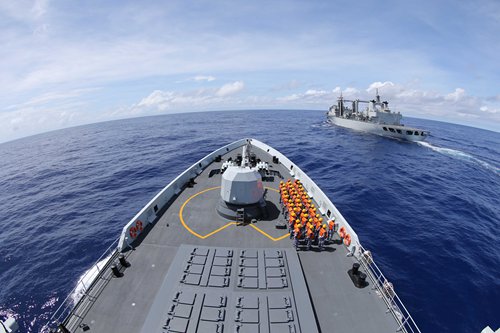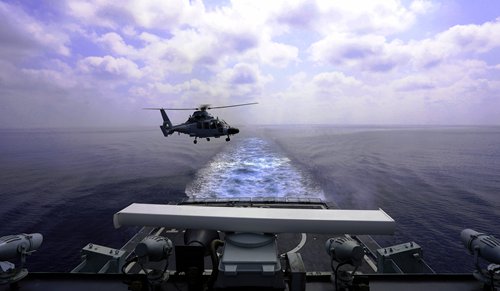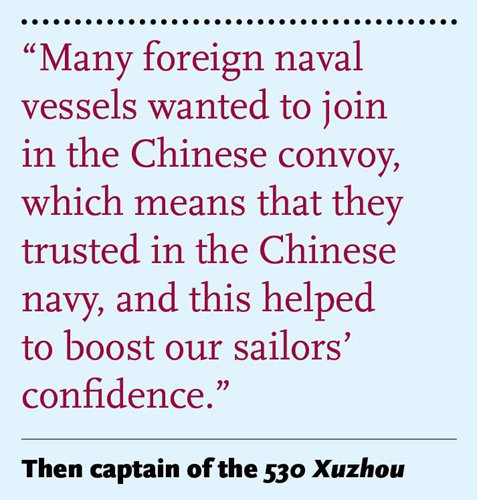
On December 26, 2008, a three-ship fleet of the Chinese navy set sail from a port in Sanya of China's southernmost Hainan Province for its first overseas deployment.
The fleet joined in the multinational patrols of the Gulf of Aden and waters off the coast of Somalia. The Navy's DDG-171 Haikou destroyer, together with another destroyer, DDG-169 Wuhan, achieved many breakthroughs and firsts.
The three-ship fleet marked the beginning of many escort missions by the Chinese navy over the past 10 years. This was China's first time to deploy its naval force to safeguard its national interests overseas, to fulfill its humanitarian obligations, and protect its main transport routes on the high seas.
Ten years later, official data show the great achievements of the Chinese navy on the high seas. As of December 24, 2018, the Chinese navy has sent 31 escort fleets, 100 ships, 67 shipborne helicopters and more than 26,000 soldiers to escort more than 6,600 Chinese and foreign ships over the past decade. They successfully rescued and escorted more than 70 Chinese and foreign ships in distress and captured three pirates.
Use of force
The size and scale of the Chinese navy escort teams has been constantly adjusted over the past decade. Between December 2008 and February 2012, the East China Sea Fleet and South China Sea Fleet took turns in going on escort missions. The North China Sea Fleet was not part of this rotation, until February 2012.
In the early stages of the escort missions, a couple of fleet formations had to carry out two voyages at short intervals. The 530 Xuzhou was part of these fleet formations. The then captain of the 530 Xuzhou told the Global Times that the quick turnaround reflected a shortage of ships available for escort missions. One depot ship had to serve two consecutive escort fleets formations during that time.
"The number of destroyers in the Chinese navy was limited, as was the number of new missile frigates capable of conducting escort missions on the high seas. Therefore, in 2010, China sent an amphibious transport dock to replenish destroyers and frigates. This was necessary to relieve the pressure on the navy," Zhang Junshe, a senior research fellow at the PLA Naval Military Studies Research Institute, told the Global Times.
He suggests that many shortcomings appeared in the first years, such as the ability of various ships to withstand the test of special sea conditions, high temperatures, high humidity and high salinity.
First logistics base
The Chinese People's Liberation Army (PLA) support base in Djibouti was established on July 11, 2017. This was China's first overseas support base, attracting wide attention from the international community, who widely interpreted it as representing a change in China's foreign policy.
The long-term voyage of the first escort group without landing at a port for a rest set a new record for continuous voyage time and mileage. In an interview, the crew told the Global Times that they most wanted fresh fruit and vegetables when they returned to land in 2009.
Retired navy captain Tian Shichen told the Global Times that escort operations involve the application of international law in terms of their area of action, objects of action, and coordinating partners. The United Nations has a special legal group for all participating countries to discuss issues related to Somali pirats. China is part of this group.
China is still groping to adapt to international rules. A long voyage without a rest is not in line with international rules and common practice, and can wear down or even harm the crew and machinery on board a warship.

Given the feedback from its first escort missions, the Chinese navy started to explore a more efficient way to guarantee its logistic support during trips overseas.
At the beginning, escort fleets mainly relied on an accompanying supply ship for logistical support. This gradually changed to getting support mainly from foreign ports along the way, which greatly reduced the navy's dependence on integrated supply ships.
An insider told the Global Times that commercial berths rented for restocking at port often give only limited time for resupplying. As soon as a ship is refreshed, it has to leave the port. This cannot guarantee the sailors' rest.
As a result, China needed to build its own logistics bases at ports of call. At the Djibouti logistics support base, the Chinese navy can get more efficient and timely replenishment, maintain equipment and allow the crew to rest.
Anti-piracy overseas
In 2010, the 530 Xuzhou was deployed to assist in response to a suspected pirate attack on Chinese-flagged cargo ship M/V Tai An Kou. After an intense battle, the special force rescued all 21 crew members from the attacked ship the next day.
Years later, the then captain of the 530 Xuzhou described the operation as "a military operation organized under the close and critical eyes of a US ship."
When the Chinese ship arrived in the area, a US warship was already cruising nearby. During the rescue, the US ship was around "to see if the Chinese navy was professional in the rescue operation," said the captain. He believes that the Chinese warship performed well in the use of force and timely response.
The 530 Xuzhou also executed an operation in the Gulf of Aden to help evacuate Chinese nationals from Libya. Facing multiple unknown factors, this is the first time the Chinese navy went abroad to participate in the evacuation of overseas Chinese. It marked a new milestone for China's non-war military operations.
Due to its success in many major tasks, the Central Military Commission awarded the Xuzhou the first-class merit honor.
At each handover ceremony, the commanders of the previous convoy formation normally introduce the latest news and updated information as well as the dynamic condition of pirates in the mission area.
During the escort period, the formation keeps detailed records of tactics and countermeasures. This information is passed on and kept updated as a textbook.
Ten years of escort missions have been a test for the Chinese navy. In the past decade, the Chinese navy has improved its escort and anti-piracy capabilities, enabling it to better fulfill its international obligations, said Zhang Junshe.
Escort ships have been able to complete anti-piracy missions five times faster over the past decade. Shipborne helicopters have been able to scramble three times faster, and special operations personnel have been able to deploy twice as quickly.
More open-minded
More than 40 escort vessels from some 20 countries gather in the Gulf of Aden. Instead of adopting a closed-minded attitude, the Chinese navy has chosen to communicate with navies of other countries and let them know more about the Chinese vessels.
During its first convoy, the Chinese navy communicated with foreign navies before the escort operation in the Gulf of Aden, including reciprocal visits and joint drills and training.
Many new records were set during the mission, such as the first joint escort and joint drill with foreign navies.
The captain of the 530 Xuzhou said sailors were nervous in the beginning of the operation and diffident when they first communicated with foreign navies.
"It was out of my expectation that we would become more and more confident when we arrived at the mission zone, and we rubbed elbows on daily basis."
"Many foreign naval vessels wanted to join in the Chinese convoy, which means that they trusted in the Chinese navy, and this helped to boost our sailors' confidence," he said.
During reciprocal visits with vessels from NATO, the EU and the US off the coast, the helicopters of the foreign military would land on the deck of Chinese vessels, and they could board Chinese vessels by boat without prior arrangement after authorization.
The reciprocal visits have not only enhanced friendship, but also served as a window allowing foreign militaries to know more about the Chinese military.
Zhang Junshe believes that the Chinese sailors' horizons have been broadened and their overall abilities have been enhanced during the escort missions, joint drills and training, reciprocal on-board visits and visits to foreign countries during and after the escort missions over the past decade.
Unmet goal
China suggested a zoned escorting system in the Gulf of Aden and waters off Somalia. This means that navies convoy all vessels passing through their patrol zone.
However, the proposal was not brought into reality, which has been the biggest regret of Tian Shichen, an advisor on naval escort missions who is responsible for both domestic and international contact and coordination in the military sector.
On October 22, 2009, Qian Lihua, former head of the foreign affairs office of China's Ministry of National Defense, suggested zoned escort cooperation among more than 20 countries in the waters off Somalia including China, the EU countries, Brazil and South Korea, to improve efficiency and avoid fighting alone. The suggestion has been embraced by many countries.

According to Tian, the suggestion proposed by China is a perfect one to optimize international escort methods, properly collect and distribute escort forces and enhance efficiency.
On November 6, 2009, an international coordination conference on naval escort missions in the Gulf of Aden was held in Beijing with the participation of deputies from Russia, India, the EU and the NATO.
Tian recalled that the conference reached an agreement on the suggestion. However, he said it is a pity that the suggestion was not brought into reality.
Tian believes that the implementation of zoned escorting cooperation would become a milestone because it would enhance the Chinese navy's ability in organizing international military events. In addition, it would meaningfully showcase China's national image and make China's voice heard in the international arena.









